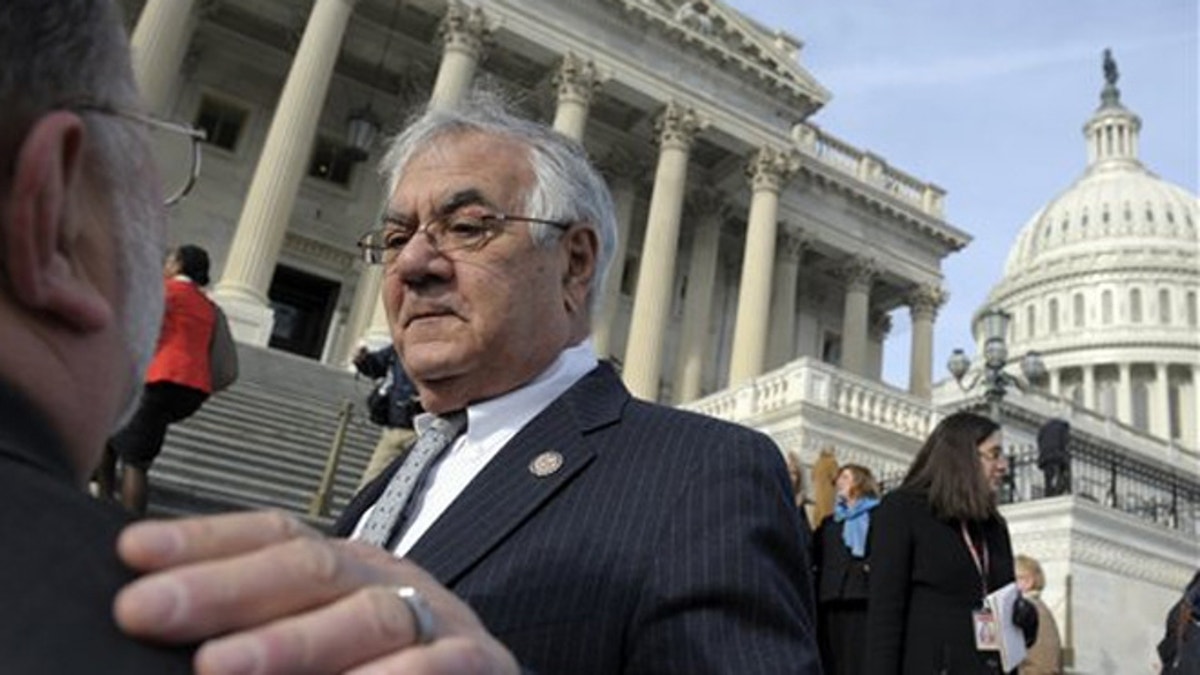
Jan. 3, 2013: Rep. Barney Frank stands outside the Capitol during his last day in Congress. (AP)
Washington – Barney Frank just can't seem to stay away from Congress.
One day after retiring as a 16-term Democratic representative from Massachusetts, Frank announced that he had asked Gov. Deval Patrick to send him back to D.C. – this time as in interim senator to fill the seat of Sen. John Kerry, who was nominated for secretary of state.
That doesn’t mean the colorful congressman will get the gig, though. Patrick says that while Frank would make a “great” interim senator, it’s not a done deal and that he hasn't made his final decision yet.
Asked by reporters if he would have preferred Frank keep his conversation with him private, the governor started laughing.
“Does it matter in the case of Congressman Frank what I would have preferred?” Patrick asked.
State law requires the governor appoint a temporary successor if and when Kerry is confirmed by the Senate. A special election would then be held between 145 to 160 days after the appointment. The interim senator would only serve a few months but that’s all the time Frank says he’ll need to get what he wants done.
“A few weeks ago, I said I wasn’t interested,” Frank said in a statement. “It was kind of like you’re about to graduate, and they said, ‘You gotta go to summer school.’ But (the fiscal cliff deal) now means that February, March and April are going to be among the most important months in American financial history.”
Frank helped lead a regulatory crackdown after the financial crisis and scored a huge legislative victory with the passing of the Dodd-Frank Wall Street Reform and Consumer Protection Act. The law, which was passed in part to respond to the crisis with the markets, has reshaped the financial landscape of the country. Frank has also been an outspoken advocate for affordable housing and has championed for consumer rights.
In the next few months, Republicans and Democrats will be going head-to-head in a series of fiscal fights. The new Congress will face three major issues before late March: the debt ceiling debate in late February, massive across-the-board federal spending cuts known as sequestration by March 1 and the need to pass a budget bill by March 27. Frank’s presence could help the Obama administration during those negotiations.
Frank also has spoken out against former Nebraska Sen. Chuck Hagel after it became clear he would be Obama's pick for defense secretary -- raising the question of whether Frank might want to log a vote against Hagel from the Senate. Frank, though, scaled back his opposition Monday. Frank told The Boston Globe he “was hoping the president wouldn’t nominate him” but said he would look past anti-gay comments Hagel made in the late ‘90s.
Frank was the first openly gay elected official to serve as a U.S. representative and has pushed hard to advance gay rights.
“As much as I regret what Hagel said, and resent what he said, the question now is going to be Afghanistan and scaling back the military. In terms of the policy stuff, if he would be rejected (by the Senate), it would be a setback for those things,” Frank said.
If Frank is tapped, he will be working on a tight timetable. Typically, interim senators aren’t remembered for their lasting contributions. Three recent short-term senators, Ted Kaufman of Delaware, Roland Burris of Illinois, and Paul Kirk of Massachusetts, stayed barely long enough to get their members pins. Kirk, though, had the politically important duty of voting for the Affordable Care Act for the Democrats.
Kaufman, 73, was picked to fill Vice President Biden's vacant Senate seat in 2009 and in an interview he said that at his age, the interim Senate appointment was more about serving out the term than effecting any great political change.
And then there was Burris. He was tapped by former Illinois Gov. Rod Blagojevich for Obama's former seat, a decision that fueled allegations that the governor had tried to get favors in exchange for the appointment. Burris decided not to run for the seat.
The Associated Press contributed to this report.




